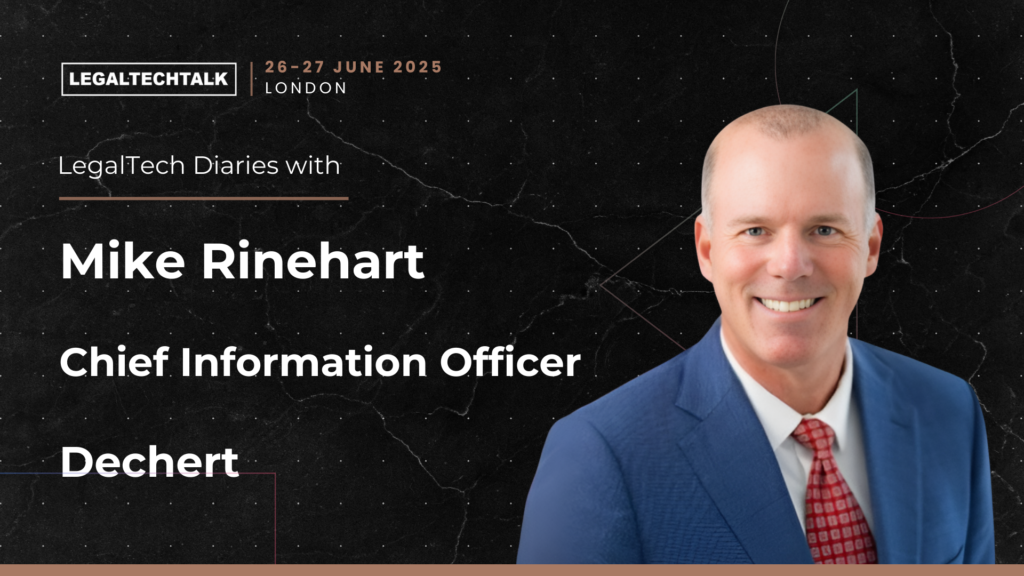Mike Rinehart, chief information officer at Dechert, and Thor Alden, associate director of innovation, have together been spearheading Dechert’s AI transformation journey, including, most recently, implementing the firm’s suite of generative artificial intelligence tools. In this Q&A, Mike pulls back the curtain on Dechert’s dual-pronged approach to innovation.
Charlotte Johnstone: Hello Mike and Thor! Can you tell me about Dechert’s strategic plan for innovation, and how the firm incorporates AI into this?
Mike Rinehart: ‘Innovation is part of our firm’s strategic plan and integral to our culture’, says Mike. ‘It’s a large part of how we see ourselves competing and winning in the legal industry.’
When the tools became available, ‘we jumped in very quickly to train the entire firm on generative AI’, Mike explains. ‘But, at that point we were already training the firm on being innovators. Aligned to the model of ‘design thinking’, we’re looking to train each and every member of Dechert – both lawyers and business professionals, through that. The aim is to arm everyone with the skills and mindset to generate ideas and drive change.’
Charlotte Johnstone: Can you explain a little more about Dechert’s approach to fostering an innovation mindset alongside delivering bespoke AI solutions?
Mike Rinehart: ‘So far, we’ve trained over 330 lawyers and business professionals (as of the end of 2023), and we’ll be training a lot more this year. The aim is that we’re tying together our rolling out of AI tools, alongside people being armed with the skills needed to be innovators’, says Mike.
In terms of the firm’s approach to deploying generative AI tools, Mike relays that the focus is on making use of bespoke AI tools tailored to Dechert’s specialities. ‘To do that, we’re taking a dual-pronged approach, which Thor can go into in more detail, but which essentially involves both building internal proprietary GenAI solutions, and collaborating with external partners in the AI space.’
As part of Dechert’s training, the firm has also rolled out a programme for its permanent lawyers, dubbed the Innovation Incubator. Through the programme, the firm gives lawyers who take part billable hour credit for work on generative AI projects, says Thor.
Over the last year, he adds, the firm saw more than 4000 hours billed to the incubator, the equivalent of two full-time people, if not more. What’s more, Thor explains, the hours were accrued by around 200 people in the last year, with just under 500 people having made use of the programme over the last 4 years.
Being not only equipped with the tools, but also feeling emboldened to utilise them fully, is key, Mike says. ‘It’s important to note that our firm culture includes innovation, so that everybody feels supported in challenging the status quo.’
Charlotte Johnstone: That’s fascinating! Could you walk me through some of the tools deployed?
Mike Rinehart: (Thor does one better than that, and starts sharing his screen with me to walk me through Dechert’s suite of tools – that is, the ones he’s allowed to show me).
‘Anybody within Dechert can go to DechertMind and our other AI tools’, says Thor. “We have a disclaimer here, which is one of the reasons we wanted to build our own tools – so we’re not subject to vendors and can put our own custom disclaimer on there. It also brings the security risks down. DechertMind is the first tool we launched – it’s no different really than ChatGPT, except that you can customise and control it.’
‘When you’re in DechertMind’, Thor continues, ‘we have this normal, good old chat tool – so I could say for example, ‘I am hosting a Legal Tech Event, what three topics should I focus on if my audience is, let’s say, a bunch of 8th graders to make it more fun.’
When asked whether the tool uses external sources, similarly to ChatGPT, Thor says it does. ‘That’s why you have to be really careful with research, you could brainstorm an area of the law, for example, but for in-depth research you still would use more established tools, and that’s why we have the disclaimer and the training programmes.’
‘The other thing we can do with DechertMind’, Thor notes, ‘is change the model. So, as these models change, we can update them and remove the old ones. We’ve already removed GPT3, because the accuracy was no longer high enough. If we wanted to, we could also plug in Claude, or some of the other LLMs as we see fit. That gives us the flexibility to swap out models, switch interfaces, but keep the user experience the same.’
Read full LegalTech Diaries Volume 5: https://www.legaltech-talk.com/legaltechdiaries/volume-5/








